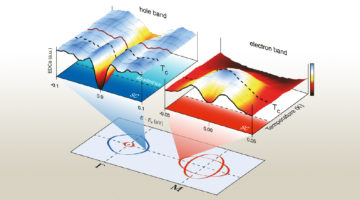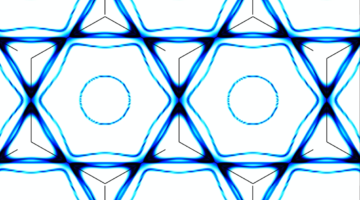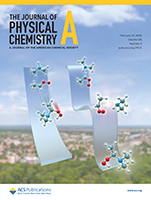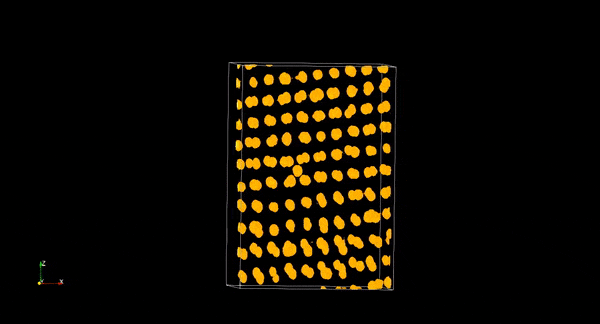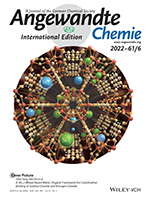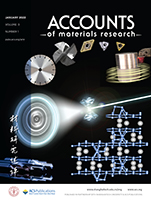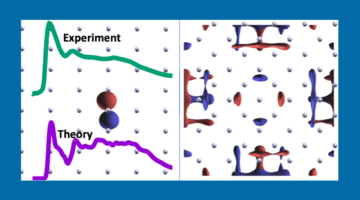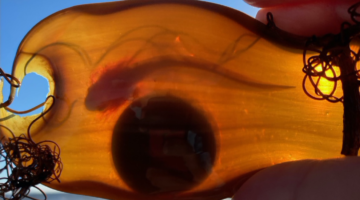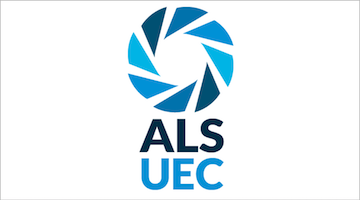Researchers found that a mysterious phase transition in an iron-based superconductor is driven by interactions between the material’s 2D layers. The results counter the assumption that interlayer coupling is negligible in such materials, suggesting instead that the interactions can be an effective way to tune superconductivity. Read more »![]()
![]()
All News & Updates
Scientists Discover ‘Secret Sauce’ Behind Exotic Properties of New Quantum Material
Kagome metals have long mystified scientists for their ability to exhibit collective behavior when cooled below room temperature. A research team has discovered that the kagome electrons’ unusual synchronicity is due to another behavior known as an electronic singularity, or the Van Hove singularity, which involves the relationship between the electrons’ energy and velocity. Read more »
Dramatic Conformer-Dependent Reactivity of the Acetaldehyde Oxide Criegee Intermediate with Dimethylamine Via a 1,2-Insertion Mechanism
Acetaldehyde-oxide (CH3CHOO) is an atmospherically pertinent reactive intermediate that exists in syn (right) and anti (left) conformational forms. Experiment and theory reveal that the reaction of anti with dimethylamine is several orders of magnitude faster than that of syn with dimethylamine, despite both reactions being energetically downhill. Read more »
With a Little Help, New Optical Material Assembles Itself
Researchers have demonstrated that tiny concentric nanocircles self-assemble into an optical material with precision and efficiency. Electron microscopy and x-ray scattering revealed the structure and spatial distribution of each ingredient in the resulting materials. The new findings could enable the large-scale manufacturing of multifunctional nanocomposites. Read more »
A {Ni12}-Wheel-Based Metal–Organic Framework for Coordinative Binding of Sulphur Dioxide and Nitrogen Dioxide
SO2 and NO2 are important air pollutants, and understanding the mechanism of capture materials drives the development of new clean-up technologies. In situ synchrotron x-ray crystallographic and spectroscopic experiments were used to establish a detailed molecular mechanism consisting of reversible coordination of SO2 and NO2 at the six open NiII sites on the unprecedented {Ni12}-wheel of a robust metal–organic framework material at crystallographic resolution. Read more »
Hardening Effects in Superhard Transition-Metal Borides
Novel superhard materials with exciting potential for applications in cutting tools and abrasives can be designed by combining incompressible transition metals with boron to create phases like WB4, pictured here. Diamond-cell-based high-pressure radial diffraction enables the direct study of lattice specific mechanisms for hardening. Read more »
COVID Booster Shots Required for Site Access Starting February 28
LBNL will require on-site users, affiliates, and employees who are eligible for booster shots to provide proof of a COVID supplemental or booster dose starting February 28, 2022. Please look out for additional guidance on how to update your COVID vaccination record. Read more »
Revealing Lithium Metal’s Electronic Structure
Spectroscopy at the ALS and theoretical calculations at the Molecular Foundry revealed the intrinsic spectroscopic signature of lithium metal and explained the origin of previous contradictory reports. The findings provide a benchmark for further studies of lithium compounds towards batteries with higher capacity and energy density. Read more »![]()
![]()
How Shark Egg Cases Balance Toughness and Permeability
Also known as “mermaid’s purses,” shark egg cases are both tough and permeable—two opposing characteristics that are necessary for the embryo’s survival. X-ray scattering at the ALS and electron microscopy helped explain how the material’s nanoarchitecture contributes to its toughness, informing future development of high-performance synthetic materials. Read more »
New Year’s Message from the Users’ Executive Committee
A warm welcome from the ALS Users’ Executive Committee 2022! We serve and represent the interests of the user community and provide a channel of communication and advocacy between the user community and ALS management. Read more »
- « Previous Page
- 1
- …
- 41
- 42
- 43
- 44
- 45
- …
- 139
- Next Page »
